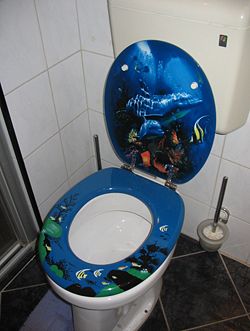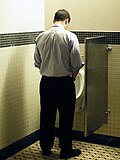Toilet

A toilet is a human waste disposal device. Toilets used in a sitting position with a toilet seat are popular in Europe and North America. There may be additional considerations for people with disabilities. Squat toilets, used in a squatting posture are more popular in Asia. This is a place where humans get rid of waste that comes from their bodies (urine and feces). Most toilets use water to flush the waste through plumbing into a sewage system. However, some modern toilets do not use water, and are called dry toilets.
A room that has a toilet can be called a "restroom" or "bathroom" in the United States. In other places it may be called the toilet, the lavatory, or the water closet (WC).
Toilets in homes

Almost all modern buildings have at least one toilet. In the home, a toilet may or may not be in the same room as a shower or a bathtub. Some toilets are outside, in an "outhouse".
In developing countries, many people do not have a toilet in their home. More than 4.5 billion people do not have access to toilets.[1]
This has led to pooping in unsafe environments such as on the side of the road which has been made later made illegal.[2][3]
Public toilets

- REDIRECT Template:See also
A public toilet may or may not cost money to use. Toilets that cost money are called "pay toilets".
Public bathrooms often have many toilets with walls between them. This makes areas called stalls (US) or cubicles (UK). Bathrooms for men often also have separate urinals. Urinals can either be on the wall for a single user, or a basin or trough for many men to use at the same time. Urinals on walls sometimes have small walls or dividers for privacy reasons.
Outdoor public toilets (in the street, around parks, etc.) are a form of street furniture. These toilets are in individual cubicles. Some are simple and have little or no plumbing. Others are less simple, and some toilets even clean themselves after every use.
Some toilet-cubicles are mobile and can be put in place where and when they are needed. These toilets are called "portable toilets". Portable toilets are commonly used at large outdoor events like concerts, festivals or carnivals.
Inventions
In 1775, Alexander Cumming patented the S-bend. This was crucial in the development of the flushing toilet. It was a simple length of pipe with a curve in it.
| Wikinews has : |
Every day, toilets use 141 billion liters of water to flush waste. Engineers try to make toilets that do not need so much water. In 2019, one group made a chemical to put in toilets to make them more slippery so that the waste flushes away with only a little water.[4][5]
Toilet Media
- Defecating into a pit (schematic).jpg
Defecating into a pit (schematic)
- Toilet 370x580.jpg
- Toilet_x
- Toilet-flush.ogg
Toilettenspülung
- Twin Pits for Pour Flush diagram.svg
Design of a twin pit latrine.
Vacuum toilet in a train in Switzerland.
- Bidet weiss.jpg
A modern bidet of the traditional type, available in many southern European and South American countries.
- 2011 07-Internal ReinventTheToilet Animation.webm
Toilets should be innovated and "reinvented" to properly address the global sanitation crisis says the Bill and Melinda Gates Foundation
- Lothal - bathroom structure.jpg
Sewage and toilet structures in the city of Lothal of the Indus river valley in around 2350 BC.
- Ostia-Toilets.JPG
Roman public toilets, Ostia Antica.
References
- ↑ Yu, Katrina (9 November 2018). "Why Did Bill Gates Give a Talk with a Jar of Human Poop by His Side?". NPR.
- ↑ "Chapter 9.25 PUBLIC URINATION AND/OR DEFECATION". www.codepublishing.com. Retrieved 2025-01-06.
- ↑ "Why do millions of Indians defecate in the open?" (in en-GB). BBC News. 2014-06-17. https://www.bbc.com/news/world-asia-india-27775327. Retrieved 2025-01-06.
- ↑ Vivianne Callier (November 18, 2019). "Superslippery toilets squash water wastage". Scientific American. Retrieved November 26, 2019.
- ↑ Penn State (November 18, 2019). "New, slippery toilet coating provides cleaner flushing, saves water". Eurekalert. Archived from the original on November 19, 2019. Retrieved November 26, 2019.
Other websites
| Wikimedia Commons has media related to Lua error in Module:Commons_link at line 62: attempt to index field 'wikibase' (a nil value).. |
